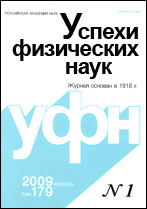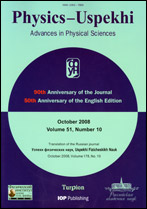|
This article is cited in 40 scientific papers (total in 40 papers)
REVIEWS OF TOPICAL PROBLEMS
Shake-up processes accompanying electron transitions in atoms
È. S. Parilis, V. I. Matveev
Arifov Institute of Electronics
Abstract:
Elementary processes in many-electron atoms–radiative and Auger transitions, photoionization, ionization by electron impact, etc.–are usually accompanied by relaxation of the electron shells. The conditions under which such an inherently many-electron problem can be solved in the shake-up approximation are examined, and the shake-up processes occurring as a result of electron transitions are described from a unified point of view. The features that are common both to this form of excitation and to the shake-up of atomic electrons following nuclear transformations are pointed out, and the distinguishing features are also noted. The various electron shake-up processes considered are the radiative Auger effect, the two-electron-one-photon transition, double ionization, spectral line broadening, the post-collision interaction, Auger decay stimulated by collision with a fast electron, and three-electron Auger transitions (the double and half Auger effects). These processes are classified according to the type of electron transition causing the shake-up, and the experimental data and methods of theoretical description are reviewed. Other effects of a similar nature that could accompany transitions in the electron shells of atoms are also mentioned. A derivation of the shake-up approximation is given, and it is pointed out that this approximation is to a large extent analogous to the distorted-waves approximation in scattering theory. It is shown that the shake-up approximation is rather effective for obtaining estimates of the probabilities of the various effects.
Citation:
È. S. Parilis, V. I. Matveev, “Shake-up processes accompanying electron transitions in atoms”, UFN, 138:4 (1982), 573–602
Linking options:
https://www.mathnet.ru/eng/ufn8927 https://www.mathnet.ru/eng/ufn/v138/i4/p573
|


|





 Contact us:
Contact us: Terms of Use
Terms of Use
 Registration to the website
Registration to the website Logotypes
Logotypes








 Citation in format
Citation in format 
